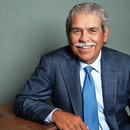Transformation in Education Requires Bold Moves
Hinojosa went on to share lessons on innovation, one of which was to learn and adapt. He also said it was important for schools to adapt “the good IRS”: incubation, replication and scale.
“We just got tested,” he said. “We’re the only industry in the world that hasn’t reinvented ourselves.”
Hinojosa noted that Uber ushered in a major change in transportation, and that Xerox has changed its value proposition many times since its founding.
“We have not changed,” he said. “The pandemic gave us a great opportunity to get that creative tension when you stretch that rubber band, but guess what? When the pandemic ended, we snapped back.”
During his second stint as Dallas ISD superintendent, Hinojosa got an outside company to analyze some of the challenges facing the district. When all was said and done, his team got taxpayers to fund a $3.4 billion bond, with much of it going to educational technology.












